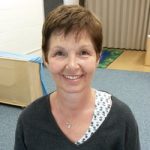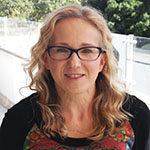 Graduate Student Rachael Farina was recently a co-leader in a discussion about inclusive sex and gender education for parents and caretakers at the Hartford Gay and Lesbian Health Collective.
Graduate Student Rachael Farina was recently a co-leader in a discussion about inclusive sex and gender education for parents and caretakers at the Hartford Gay and Lesbian Health Collective.
Author: Janice Berriault
Rachael Farina featured in Verywellmind.com article
 Graduate Student Rachael Farina was featured in an article on Verywellmind.com entitled, Understanding and Managing Intrusive Thoughts In Romantic Relationships. Read the article here.
Graduate Student Rachael Farina was featured in an article on Verywellmind.com entitled, Understanding and Managing Intrusive Thoughts In Romantic Relationships. Read the article here.
Rebecca Puhl interviewed by NBC News
 NBC News recently interviewed Professor Rebecca Puhl about weight stigma and new medications for obesity. Read the article here.
NBC News recently interviewed Professor Rebecca Puhl about weight stigma and new medications for obesity. Read the article here.
UConn Child Labs hosted their first Lunar New Year Celebration


The UConn Child Labs hosted their first Lunar New Year Celebration, organized by Child Labs families and classroom teacher Heather Leeman. The event was attended by children and families enrolled in the Child Labs, Professional Teaching Staff and HDFS ECE students. Families led art and music activities and classroom teacher, Debbie Muro, led families through a child friendly yoga practice themed around the Lunar New Year. It was a great success and we hope to have many more opportunities for families to share their cultural practices with others in our community.
HDFS grad students and faculty present at SRCD conference
Twelve HDFS students and fifteen HDFS faculty will be giving 30 presentations at the Society for Research in Child Development (SRCD) conference in Salt Lake City, Utah, this March. See a list of all of the presentations here.
Andrea Lopez Salazar, HDFS Alumni Spotlight, February 2023
 Andrea Lopez Salazar is a researcher, educator, and leader with a history of working in the K-12, higher education, and nonprofit sectors. Andrea graduated Magna Cum Laude in 2014 with a B.A. in Human Development and Family Studies and a minor in Women’s, Gender, and Sexuality Studies. She credits her experience at UConn as fundamental to instilling a love of and curiosity for the social sciences. During her time at UConn, Andrea was engaged in research, particularly on projects related to ethnic-racial socialization among Black and Latinx families. She was the recipient of the Summer Undergraduate Research Fund (SURF) Award, OUR Travel Award, and the Social Sciences, Humanities, and Arts Research Experience (SHARE) Award.
Andrea Lopez Salazar is a researcher, educator, and leader with a history of working in the K-12, higher education, and nonprofit sectors. Andrea graduated Magna Cum Laude in 2014 with a B.A. in Human Development and Family Studies and a minor in Women’s, Gender, and Sexuality Studies. She credits her experience at UConn as fundamental to instilling a love of and curiosity for the social sciences. During her time at UConn, Andrea was engaged in research, particularly on projects related to ethnic-racial socialization among Black and Latinx families. She was the recipient of the Summer Undergraduate Research Fund (SURF) Award, OUR Travel Award, and the Social Sciences, Humanities, and Arts Research Experience (SHARE) Award.
After graduating from UConn, Andrea worked at the Stamford Public Education Foundation in Connecticut where she managed the organization’s flagship mentoring program. Currently, she works at Columbia University’s Community College Research Center where she conducts and publishes research on advising reform among first-generation college students and students of color. She is working on an IES-funded longitudinal, mixed-methods project to study the personal support networks of first-generation college students over their first and second year.
Outside of college access and equity, Andrea is very passionate about community-based research, arts education, and multilingualism. She works as an ESL teacher at Columbia’s Community Language Program and has taught and tutored students from all over the world. Most recently, Andrea received a prestigious award from the American Education Research Association to lead a project on the experiences of predominantly limited-income Latinx families in a music education program during the COVID-19 shutdown. The study was funded by the association’s Education Research Service Projects program, an initiative created to encourage education researchers to offer their pro bono expertise to educational organizations, institutions, or other community groups. She presented at the National Association for Music Education last fall and is looking forward to publishing her findings in English and Spanish this year.
Andrea holds an Ed.M. from the Harvard Graduate School of Education and a certificate in Teaching English to Speakers of other Languages (TESOL) from Teachers College, Columbia University.
In her spare time, Andrea enjoys swimming, playing piano, and learning new languages. She speaks Spanish and French and always enjoys experiencing new cultures!
Peter McCauley, HDFS Graduate Student Spotlight, February 2023
 Peter McCauley joined the HDFS department in the Fall of 2022 and is working with Dr. Ryan Watson. Before coming to UConn, he attended the University of Kentucky, earning a B.A. in Psychology with minors in Spanish and Linguistics and graduated Summa Cum Laude. While at the University of Kentucky, he was a research assistant in Dr. Christia Brown’s Social Inequality in Development Lab. Under the direction of Dr. Brown, Peter worked on research examining how children develop and perceive stereotypes and how various forms of school-based discrimination affect historically marginalized youth. He also volunteered as an ESL tutor for first-generation immigrant elementary school students in local public schools.
Peter McCauley joined the HDFS department in the Fall of 2022 and is working with Dr. Ryan Watson. Before coming to UConn, he attended the University of Kentucky, earning a B.A. in Psychology with minors in Spanish and Linguistics and graduated Summa Cum Laude. While at the University of Kentucky, he was a research assistant in Dr. Christia Brown’s Social Inequality in Development Lab. Under the direction of Dr. Brown, Peter worked on research examining how children develop and perceive stereotypes and how various forms of school-based discrimination affect historically marginalized youth. He also volunteered as an ESL tutor for first-generation immigrant elementary school students in local public schools.
During his final year at the University of Kentucky, Peter conducted his honors thesis examining why and when adolescents perpetrate gender-based harassment, and the contextual factors, such as sexual prejudice and gender typicality, that influence the frequency of this harassment within schools. This line of work motivated Peter to join the SHINE (Sexuality, Health, and INtersectional Experiences) lab to study queer identity development and experiences with bias-based harassment. While at UConn, Peter hopes to research how bias-based harassment, and the emotional distress as a result of experiencing this type of harassment within schools, influences queer youth’s well-being and identity development. Additionally, he hopes to use this work to leverage intervention methods that reduce the amount of harassment youth face, with the long term goal of creating healthy learning environments for all.
Peter is excited to be continuing his academic journey at UConn in a department that is highly involved with applied research surrounded by supportive faculty and colleagues. He looks forward to expanding his knowledge and working in the SHINE lab throughout his years at UConn. When not working, Peter loves to explore new vegan recipes, play his violin, and has recently tried his hand at baking (currently unsuccessfully) with his partner, Carson.
Maria LaRusso, HDFS Faculty Spotlight, February 2023
 Maria LaRusso is a developmental psychologist and interdisciplinary scholar with research that integrates perspectives and approaches from human development, psychology, health, education, and anthropology. However, her work has been most profoundly shaped by her training in Human Development, and in particular Bioecological Systems Theory which explains how development is shaped through interactions between the individual and their surrounding contexts (family, school, community, etc.) which are nested within other systems that include cultural, economic, and political factors, as well as sociohistorical circumstances and change over time. Early in her career, she also worked as a child and family therapist and brings a clinical perspective to her research. For instance, her training in structural family therapy solidified her approach to understanding pathology and well-being as not laying within the individual, but within the interrelated “systems” that make up one’s world.
Maria LaRusso is a developmental psychologist and interdisciplinary scholar with research that integrates perspectives and approaches from human development, psychology, health, education, and anthropology. However, her work has been most profoundly shaped by her training in Human Development, and in particular Bioecological Systems Theory which explains how development is shaped through interactions between the individual and their surrounding contexts (family, school, community, etc.) which are nested within other systems that include cultural, economic, and political factors, as well as sociohistorical circumstances and change over time. Early in her career, she also worked as a child and family therapist and brings a clinical perspective to her research. For instance, her training in structural family therapy solidified her approach to understanding pathology and well-being as not laying within the individual, but within the interrelated “systems” that make up one’s world.
After completing a doctorate in Human Development and Psychology at Harvard University, Maria continued her training at the University of Pennsylvania and New York University with a Postdoctoral Education Research Training (PERT) Fellowship, which was created through a joint effort of the American Psychological Association and the Institute of Education Sciences to bring intervention research and experimental methods from psychology to educational settings. Her subsequent research focused on a range of social-emotional, behavioral, and risk prevention programs in schools, aiming to understand how interventions impact individuals and contexts and how individuals and contexts impact intervention delivery and success.
Maria’s more recent research is driven by the need for programs with larger, more consistent impacts and the urgent need to address significant declines in youth well-being and mental health over the past decade. In her current studies she investigates factors contributing to these declines, including research with families, schools, and pediatric physicians and studies of youth with chronic health conditions that cause brain inflammation and psychiatric symptoms (PANS/PANDAS). She is also working on new interventions that aim to reduce stress and improve well-being and mental health among adolescents, with an emphasis on children’s rights to healthy development. In particular, she has two new studies to evaluate a pilot of a program for adolescents that bridges mindfulness-based stress reduction practices with self-care activities and social activism to advocate for changes to support both individual and collective well-being. The program is being piloted in Connecticut and Bogota, Colombia, where her research has been supported by two Fulbright awards.
Outside of work, Maria enjoys music, foreign films, reading, meditating, being in nature, and traveling (especially to Colombia and anywhere in Latin America), but most of all, she enjoys spending time with her husband (also a professor at UConn), their two daughters, and Lola, their spunky Havanese.
Rebecca Puhl, NYT interview on childhood obesity
 The New York Times recently interviewed Professor Rebecca Puhl on the new American Academy of Pediatrics guidelines on treatment for childhood obesity. Read the article here.
The New York Times recently interviewed Professor Rebecca Puhl on the new American Academy of Pediatrics guidelines on treatment for childhood obesity. Read the article here.
Ryan Watson featured in article on rights of LGBTQ+ youth
 Associate Professor Ryan Watson was featured in an article on how state laws restricting the rights of LGBTQ+ youth are detrimental to their mental health.
Associate Professor Ryan Watson was featured in an article on how state laws restricting the rights of LGBTQ+ youth are detrimental to their mental health.